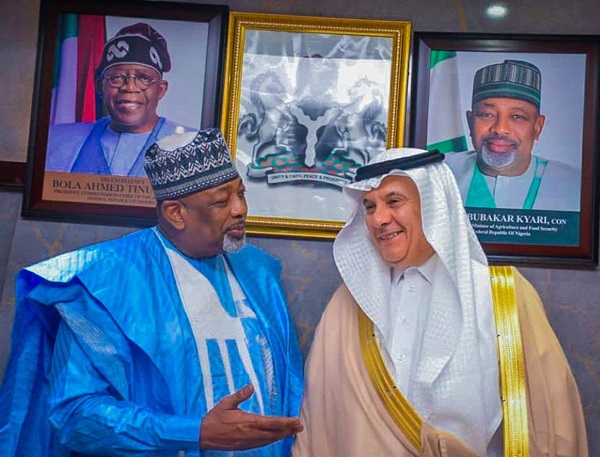
In a bid to bolster Nigeria’s agricultural sector and attract increased investment, the Federal Ministry of Agriculture and Food Security (FMAFS) has entered into a partnership with the Ministry of Environment, Water and Agriculture (MEWA) of Saudi Arabia.
The announcement was made by the Minister of FMAFS, Sen. Abubakar Kyari during the visit of a delegation from Saudi Arabia led by that country’s Minister of Environment, Water and Agriculture of Saudi Arabia, Engr. Abdulrahman Alfadley at the ministry’s headquarters in Abuja.
Kyari emphasised the mutual benefits of the partnership, highlighting Nigeria’s diverse array of crops ripe for investment and the opportunities Saudi Arabia presents for collaboration in the agricultural sector.
The minister outlined the national goal of enhancing agricultural production and productivity, with a focus on value addition to agricultural produce. He expressed optimism that the collaboration would result in mutually beneficial deals for both countries.
The significance of the partnership was underscored, with emphasis on the priority accorded to food security and agriculture by the administration of President Bola Ahmed Tinubu. Kyari noted the strong historical ties between Nigeria and Saudi Arabia, both culturally and economically, and reiterated the Tinubu’s commitment to accommodating innovative ideas that promote sustainable development and investment in the agricultural sector.
As part of its economic management strategy, FMAFS actively engages with the nation’s Economic Management Team and regularly briefs the National Economic Council to ensure coherence in economic policies and initiatives.
Kyari provided insights into the ministry’s work plan, which includes short, medium and long-term timelines aimed at developing Nigerian agriculture. The focus is on achieving year-round cropping in both dry and wet seasons, targeting staple crops such as wheat, rice, maize, cassava, sesame, soybean and sorghum.
Mechanisation plays a pivotal role in the ministry’s agricultural production strategy, with partnerships established with reputable agricultural equipment manufacturers globally.
The livestock modernisation programme, a priority for the current administration, presents significant investment opportunities in areas such as ranching, breed improvement, feed and pasture development, and value addition within the special agro-industrial processing zones (SAPZs) across the country.
Kyari reiterated the government’s commitment to strengthening the agricultural sector, enhancing Nigeria’s global appeal to investors and fostering mutually beneficial partnerships with countries like Saudi Arabia.
Alfadley, in response to the partnership, affirmed MEWA’s commitment to facilitating communication with the Saudi Agricultural and Livestock Investment Company (SALIC) to engage potential investors. He assured both private and public sectors of negotiations geared towards sustainable investments benefiting Nigeria.
President of the Nigerian Saudi Chamber of Commerce, Industry, Mines and Agriculture, Engr. Ibrahim Usman emphasised Nigeria’s agricultural potential and the willingness of Nigerians to collaborate with Saudi Arabia. He highlighted the exchange of resources, technical support and funding as avenues to achieve shared goals and objectives.
The private sector echoed the call for collaboration, seeking to leverage Saudi Arabia’s expertise and resources to boost agriculture in Nigeria, further cementing the partnership’s potential for driving sectoral growth and development.

